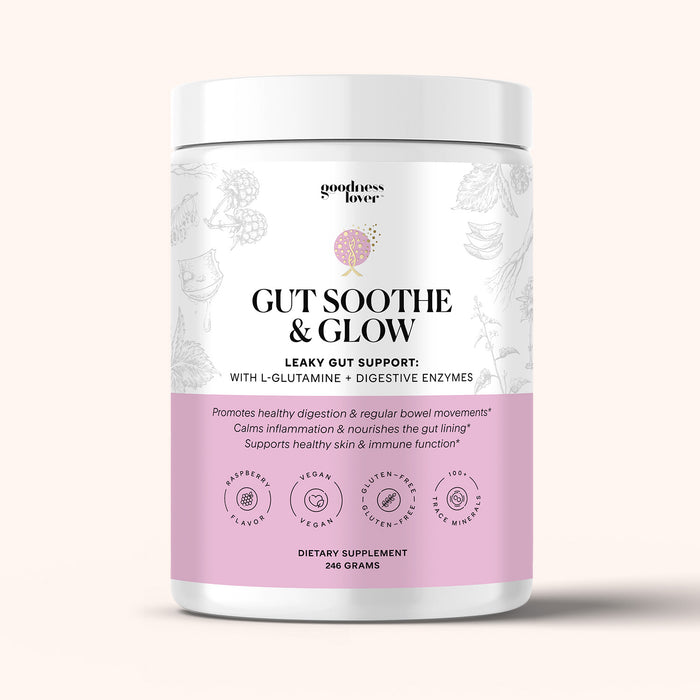Welcome back to our deep dive into eczema and its connection to the gut. In part 1, we explored how those frustrating flare-ups aren't just skin-deep—they're closely tied to what's happening in your gut. We uncovered the complex dance between your microbiome, immune system, and skin health.
Now it's time to turn that knowledge into action. We’re going to move beyond managing symptoms and dive into natural, science-backed strategies that address eczema at its root. By addressing your gut imbalances, calming inflammation, and nourishing your body from within, you can take meaningful steps toward long-term relief and healthier skin.
But before we jump into treatment strategies, let's talk about something crucial that conventional medicine often overlooks: comprehensive testing.
Table Of Contents:
Testing: Getting to the Root Cause
Think of your body like a complex puzzle. While conventional doctors might only look at the obvious pieces (your skin), it's crucial to see the whole picture for long-term results. Two key functional medicine tests can help unlock the mystery of your eczema and guide your healing journey.
The GI Map test is like getting a detailed blueprint of your gut's ecosystem. This comprehensive stool test reveals which beneficial bacteria are thriving or missing, identifies any unwanted guests like harmful bacteria or yeasts, and shows how well your gut is protecting itself. As we discovered in Part 1, in eczema sufferers there are often low levels of beneficial bacteria, particularly Bifidobacterium and Akkermansia, alongside problematic overgrowth of bacteria like Staphylococcus.
Complementing this is the Organic Acids Test (OAT), which offers a peek into your body's chemical factory through a simple urine sample. In eczema patients, this test often reveals elevated oxidative stress, B vitamin deficiencies, and signs of poor fatty acid metabolism. It also helps us understand how well your body is detoxifying and using nutrients—crucial information for creating an effective healing protocol.
Understanding these test results helps create a targeted, personalized healing protocol instead of just throwing random supplements at the problem.
Diet: The Foundation of Healing
Healing eczema isn’t just about what you put on your skin—it starts with what you put in your body. The right dietary choices can help calm inflammation, repair the gut, and restore balance, while the wrong foods can fuel flare-ups and keep you stuck in the cycle of itching and irritation.
Foods That Can Trigger Inflammation
Not everyone with eczema reacts to specific foods, but for many, certain dietary triggers can worsen symptoms by driving inflammation and overstimulating the immune system. Identifying and removing your personal triggers can be a game-changer.
The most common culprits include:
- Dairy – One of the biggest eczema triggers. The casein and whey proteins in dairy can provoke immune responses, leading to increased inflammation and skin irritation.
- Eggs – Particularly the whites, which are high in ovalbumin, a common allergen that can drive immune reactions and worsen skin inflammation.
- Gluten and/or wheat – For those with gluten sensitivity or celiac disease, gluten can increase intestinal permeability, allowing unwanted proteins and toxins to leak into the bloodstream and trigger inflammation. Even in those without celiac disease, gluten-containing grains can sometimes worsen eczema symptoms.
- Soy – A known allergen that can act as an endocrine disruptor, interfering with hormone balance and immune function.
- Peanuts – A common allergen that can trigger histamine release, leading to itching, redness, and worsening eczema symptoms.
- Nightshades (tomatoes, peppers, eggplants, potatoes) – These contain alkaloids that may aggravate inflammation in some individuals.
- Histamine-rich foods – Many eczema sufferers have an underlying histamine intolerance or mast cell dysfunction, which means high-histamine foods (such as aged cheeses, fermented foods, cured meats, and alcohol) can lead to flare-ups.

Even if you don’t have a specific food intolerance, certain foods are universally inflammatory and can make eczema harder to manage. These include:
- Refined sugars & processed carbohydrates – Excess sugar feeds harmful gut bacteria, contributes to blood sugar imbalances, and increases systemic inflammation, all of which can worsen eczema.
- Food additives & preservatives – Artificial flavors, colors, MSG, and preservatives can disrupt the gut microbiome and trigger immune reactions, leading to increased inflammation.
- Excess saturated fats – While healthy fats are essential for skin repair and reducing inflammation, excess saturated fat from processed and fried foods, conventionally raised meats, and hydrogenated oils can contribute to oxidative stress and worsen symptoms.
Foods That Heal
Instead of focusing only on what to avoid, let’s shift the perspective to nourishing the body with foods that actively support gut health, immune balance, and skin repair. The right nutrients can reduce inflammation, strengthen the skin barrier, and help calm the overactive immune response that fuels eczema.
- Plants and fiber: A fiber-rich, plant-forward diet helps diversify the gut microbiome, regulate immune function, and reduce inflammation. Fiber feeds beneficial gut bacteria, which play a key role in producing short-chain fatty acids (SCFAs) that support skin health and immune balance.
- Leafy greens: Dark, leafy greens like kale, spinach, Swiss chard, and arugula are nutritional powerhouses for eczema healing. They're packed with vitamin A, which is essential for skin regeneration and repair. These greens also provide vitamin C, a powerful antioxidant that supports collagen production and helps reduce oxidative stress, as well as magnesium, which helps calm inflammation and supports a healthy stress response.
- Quercetin-rich foods: Quercetin is a potent antioxidant and mast cell stabilizer that can help reduce histamine-related eczema flare-ups. It’s found in apples, onions, kale, and berries.
- Omega-3 fatty acids: Healthy fats fortify the skin barrier, prevent excessive moisture loss, and modulate inflammation. Omega-3s are especially beneficial for reducing eczema-related dryness and irritation. Top plant-based sources include avocados, walnuts, flaxseeds and chia seeds.
- Fermented foods: Since eczema is closely linked to gut health, increasing beneficial bacteria through fermented foods can support immune regulation, improve digestion, and reduce inflammation. Try adding some sauerkraut, kimchi, coconut yogurt, and kombucha (if tolerated, as some with histamine intolerance may react).
- Hydration: Water is often overlooked in skin healing, yet proper hydration keeps skin cells plump and resilient, reducing dryness and irritation. It also helps the body flush out toxins. Aim for at least 8 glasses of filtered water daily, adjusting for activity level and climate.
Lifestyle Strategies to Calm Eczema
When it comes to calming eczema, what you do is just as important as what you eat. Let's start with stress management—because let's face it, having eczema is stressful, and stress makes eczema worse. It's a vicious cycle that needs breaking.
Mindfulness practices aren't just trendy buzzwords—they're powerful tools for reducing inflammation. Even 10 minutes of daily meditation can significantly lower stress hormones that trigger flares. Think of it as hitting the pause button on your body's stress response. Gentle yoga can be especially beneficial—it combines stress relief with gentle movement that supports lymphatic drainage without overheating the body (which can trigger itching).
Sleep deserves special attention in your healing journey. Your skin does most of its repair work at night, so prioritizing good sleep isn't just about feeling rested—it's about giving your skin its best chance to heal. Create a cool, dark sleeping environment, and consider using breathable, natural fiber bedding to prevent night sweats that can trigger itching.
Speaking of temperature, let's talk about bathing. While a hot shower might feel good in the moment, it can strip your skin's natural oils and trigger flares. Instead, opt for lukewarm baths with healing additions. Colloidal oatmeal baths (or as an ointment) are particularly effective—they create a protective, moisturizing film on your skin while reducing inflammation. Dead Sea salts can also work wonders, providing minerals that support skin barrier function while calming inflammation.
Natural Topical Treatments
What you put on your skin matters too. Think of topical treatments not as quick fixes, but as supporters of your skin's natural barrier function and healing process.
Calendula cream shows considerable potential for supporting eczema-prone skin, thanks to its anti-inflammatory and antimicrobial properties. Its soothing effects may help calm irritation and support the skin's natural healing process. Manuka honey is another powerhouse healer—it's not just antimicrobial but also helps maintain skin moisture and reduce inflammation.
Plant-based oils can be game-changers when chosen correctly. Evening primrose oil, applied topically, provides gamma-linolenic acid (GLA) that helps restore skin barrier function. Coconut oil, particularly virgin and cold-pressed, offers both antimicrobial properties and moisture retention. However—and this is important—always patch test new products, even natural ones, as sensitive skin can react to anything new.
For those dealing with persistent Staph aureus colonization (a common issue in eczema), colloidal silver or specific essential oil nasal sprays can help eradicate both skin and nasal colonies. Just be sure to use properly diluted, high-quality products.
Supplement Support
While diet and lifestyle form the foundation of healing, strategic supplementation can be powerful tool to accelerate progress and tackle gut imbalances revealed by testing head-on.
If test results reveal an H. pylori infection, targeted compounds like mastic gum, deglycyrrhizinated licorice (DGL), and black cumin seed can help eliminate the bacteria while soothing the stomach lining. If bacterial overgrowth is present, herbs like olive leaf, Oregon grape, golden seal, and garlic work as nature's antibiotics. For fungal issues, powerful botanicals like pau d'arco, rosemary, and uva ursi can help restore balance. And if protozoa are causing trouble, oregano oil, thyme, wormwood, and black walnut are your allies in clearing these persistent parasites.
But eliminating the troublemakers is only half the battle—we need to rebuild your gut's "good guy" population too. If your test results show low levels of beneficial bacteria like Akkermansia muciniphila, polyphenol-rich foods from cranberries, grapes, and cocoa can help boost these crucial populations. Low in Faecalibacterium and Roseburia? Consider emerging prebiotics like XOS (xylo-oligosaccharides), resistant starch, and berry blends (cranberry, blueberry, pomegranate) to nurture these beneficial bacteria back to health.
For comprehensive support, marine-derived compounds like fucoidan from seaweed have shown remarkable promise in boosting Akkermansia populations, while synbiotic approaches combining specific prebiotics with beneficial bacteria offer targeted strategies for microbiome restoration.
To repair and strengthen your gut lining, incorporate therapeutic compounds like L-glutamine, slippery elm, marshmallow root, DGL, and zinc carnosine—these work synergistically to heal leaky gut, reduce inflammation, and create the optimal environment for beneficial bacteria to thrive.
Don't forget about crucial nutrients for skin health. Vitamin D is often low in eczema sufferers, and a well-rounded multivitamin can also help address any micronutrient deficiencies that might be impeding healing. Finally, to boost your omega-3 intake, consider an algae-based oil supplement or evening primrose oil.
The Road to Lasting Relief: Your Path Forward
Living with eczema can feel like being stuck on a frustrating merry-go-round of flares and temporary relief. But now you understand that true healing isn't about chasing symptoms—it's about creating an environment where your body can heal itself, starting with your gut.
Think of this approach like tending a garden. You can't just pull weeds (treat symptoms) and expect beautiful flowers to grow. You need to enrich the soil (heal your gut), provide the right nutrients (through diet and supplements), and ensure proper growing conditions (lifestyle factors). Some days, you might not see progress, but beneath the surface, healing is happening.
This protocol is not a one-size-fits-all. Those functional medicine tests are your personal roadmap, revealing exactly what your body needs—whether it's tackling candida overgrowth or rebalancing your gut bacteria. Working with a functional medicine practitioner can help you interpret these results and create a targeted healing protocol.
Most importantly, be patient with yourself. Your skin's patterns didn't develop overnight, and healing takes time. But with consistency and the right approach, you can break free from the cycle of endless flares and create lasting change.















What Do You Think? Comment Below: